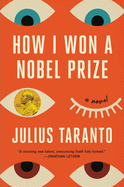
How I Won a Nobel Prize commits to the flying trapeze as Julius Taranto performs a high-wire act, balancing savvy political satire with brilliant character development and prose that sings and guffaws with nuance. Taranto writes his characters with depth and delight, making readers want to continually return to see what they are doing.
Helen is a bright young physicist who is positive she can save the world--if she can just find the right material for a superconductor. When her mentor is involved in a sex scandal and is "canceled," she must decide if she should follow him to a private university funded by a provocative billionaire, where those in academia who have too many skeletons in their closet are sent to thrive and do research: "The popular vision, at the beginning, was of an academic prison colony where the worst-behaved of great minds would live out their days, closed off from the pleasures of civilized life. We had not... expected them to have such a good time." For Helen, there is no real decision; she goes and brings her husband, Hew, with her, and so ensues a comedy of manners and ideals that ponders what makes someone "good."
The plot is so outlandishly ridiculous that it's surprising it works so well. Taranto gives the characters enough heart and zest that readers will want to go along for the ride, accepting the wildness that comes with an earnestness not often found in debuts. --Dominic Charles Howarth, book manager, Book + Bottle

